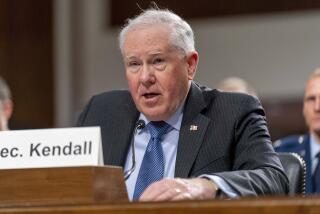Worker’s Stealth Access Is Restored by Air Force : Defense: Northrop employee had lost his clearance to the program because he has two elderly sisters in India.
- Share via
The Air Force has reversed an earlier decision to cancel a highly skilled computer engineer’s access to the Northrop B-2 Stealth bomber program because he has two elderly sisters in Madras, India.
Thasamuthu Ramakrishnan, a U.S. citizen for nine years, lost his job last year on the B-2 program after Air Force security officials concluded that his immediate family abroad posed a security risk. His sisters are cotton farmers with whom he has had little contact in recent years.
Ramakrishnan, 56, was notified this week that his access to the program had been restored after a Times story last February prompted the Air Force to look into the matter. A Northrop spokesman said Ramakrishnan is scheduled to start work April 26.
U.S. security experts said the Air Force’s withdrawal of access in Ramakrishnan’s case appeared inconsistent with U.S. government policy and not based on normal defense industry security procedures.
Top-secret military programs require special access, and the withdrawal of Ramakrishnan’s clearance appears to reflect the questionable rules that have evolved in the nation’s “black” world of defense.
The withdrawal had been harshly criticized by advocates of Asian-Americans who said it was typical of the unfair scrutiny to which they are sometimes subjected by the government.
After the Air Force withdrew his access last year, Ramakrishnan said, he had little apparent recourse. The office at Wright-Patterson Air Force Base in Ohio that made the decision does not even have a telephone number listed at the base’s switchboard.
Jaak Treiman, Ramakrishnan’s attorney, said he did not file a legal challenge because, with few exceptions, courts will not encroach on the authority of the executive branch to set industrial security policy.
After The Times article, however, the Air Force began to reconsider the action, and officials indicated privately that it appeared to be a bureaucratic snafu.
Despite his six months of unemployment during the affair, Ramakrishnan said he is happy to have the matter resolved.
“My intention was never to take to task anybody,” he said. “I need a job. I was denied access for no reason. Even though somebody made a mistake, we just forgive them and go on. I give credit to the Air Force for changing their opinion.”
Until mid-1992, Ramakrishnan had access to the B-2 program and had been working as an employee of TRW on loan to Northrop.
But when Northrop offered him direct employment, the Air Force re-examined his file and denied him the new access. In a letter, the Air Force said the denial was based on his family connections in India.
Although India is not a military ally, the country has not been formally classified by the State Department or Justice Department as a threat to the United States.
Air Force security officials said the mix-up occurred because Northrop had failed to provide a letter claiming a “compelling need” for Ramakrishnan. It remains unclear why such a letter would be needed in Ramakrishnan’s case, since these letters are typically required to mitigate other information that argues against granting access.
Ramakrishnan, an expert in cockpit software, had established an exemplary employment record prior to his run-in with the Air Force. Although Northrop is laying off some employees on the B-2, it needs Ramakrishnan’s special skills for continuing engineering work on the program, a company spokesman said.
More to Read
Sign up for Essential California
The most important California stories and recommendations in your inbox every morning.
You may occasionally receive promotional content from the Los Angeles Times.














